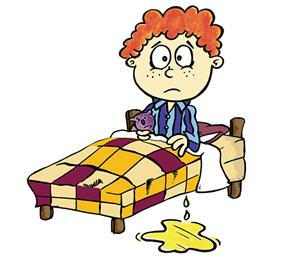Urinary Incontinence in Children
- posted: Apr. 19, 2013
Urinary Incontinence in Children
Toilet training is not an exact science, and many kids have bedwetting episodes. Learn about the causes of urinary incontinence in children and when to be concerned about a bladder problem

What’s Behind Bedwetting
Getting through the night without an accident can take a little longer to master than daytime incontinence. It’s more common for children to wet the bed after age five than it is for them to have accidents during the day. Here’s what could be happening if your child is experiencing bedwetting:
- It’s in the genes. If both parents experienced bedwetting, a child has an 80 percent chance of having problems staying dry at night.
- Deep sleeper. Nighttime incontinence is also related to a child being a deep sleeper.
- A smaller bladder. Your child’s bladder may simply be smaller than other children her age, which makes it easier for the bladder to become full and spill over.
- Fluid retention. Children who wet the bed tend to retain more fluid than other children, Dr. Atala says. Our bodies retain fluid for our organs, such as our heart. But when you lie down, your heart doesn’t need to work as hard and your body gets rid of the extra fluid. Children who are more active during the day retain more fluid than children who aren’t as active.
- The internal alarm is still developing. We all have an internal alarm that wakes us when our bladder needs to be emptied. The alarm becomes stronger as the child gets older.
- Hormones aren’t lowering urine levels. Antidiuretic hormone is released at night to slow down the production of urine, but some children may not be producing enough of the hormone to stay dry while they sleep.
- Anxiety. Anxiety and stressful events, such as a new baby sibling, can cause a child to take a longer time to potty train at night or cause a child who’s already potty trained to start having bladder problems.
- Sleep apnea. If she’s having trouble breathing at night due to inflammation or an enlargement of her tonsils or adenoids, it could be causing nighttime incontinence. Often, treating the sleep apnea can also help keep her dry.
- Physical problems. For only a small number of children, the cause of nighttime incontinence may be a blockage in the bladder or the urethra. For children with spina bifida, a birth defect of the spinal cord, nerve damage can also result in bedwetting.
How to Treat Incontinence in Children
Luckily, bladder problems tend to go away on their own — if you give them time. Here’s what you can do in the meantime:
- Schedule potty visits. If your child is suppressing the urge to go during the day, Atala recommends taking your child to the bathroom about every two hours. To prevent bedwetting, have your child lie down to read a book to help mobilize the fluid, and then have her get up to use the bathroom before going to sleep. Also, limit the amount of fluid she drinks at night.
- Reset the clock. If your child has an overactive bladder, a doctor can prescribe medication that will help get the bladder back on schedule.
- Consider a "wet alarm." You can use a wet alarm, or a moisture alarm, in which your child wears a pad in her pajamas that connects to an alarm that goes off as soon as there’s any moisture. It can help your child learn to wake up before wetting the bed. Wet alarms work best for children who are already waking up dry a couple of nights a week and who aren’t deep sleepers, Atala says. You can purchase a wet alarm at a local or online pharmacy.
Treat conditions that could be causing it. Getting treatment for sleep apnea can help cure bedwetting. It’s also important to be sure your child doesn’t have a UTI or a condition such as diabetes that leads to an increase in fluids.
Suszynski, Marie. "Urinary Incontinence in Children." EverydayHealth.com. N.p., n.d. Web. 19 Apr. 2013.
This website includes materials that are protected by copyright, or other proprietary rights. Transmission or reproduction of protected items beyond that allowed by fair use, as defined in the copyright laws, requires the written permission of the copyright owners.










